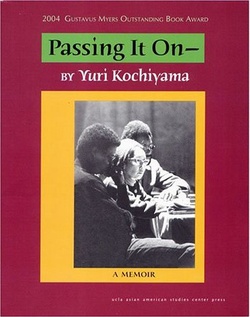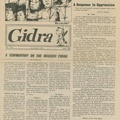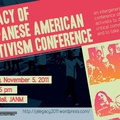In 1998, then seventy-seven year old Yuri Kochiyama began writing her memoir, after years of contemplating what to leave her grandchildren in remembrance of their family’s heritage. Whatever path they, or anyone who reads this memoir, choose to take, Yuri believes that, at the very least, one should be aware of their history.
“To live a life without losing faith in God, my fellowmen, and my country…To love everyone; to never know the meaning of hate, or have one enemy…An enemy, to me, is only created in one’s mind.”
Through these words emanate the strength and drive of Yuri in all that she endeavored in her life. A recipient of the 2004 Gustavus Meyers Center, Yuri opens her memoir, Passing It On, with “Twenty-two,” a list of promises she vowed to keep at the young age of eighteen. Her maturity and passion are reflected in this seemingly simple, yet, profound expression of her personal values and philosophy of life. And her resolve has never wavered.
Born Mary Yuriko Nakahara on May 19, 1921 in San Pedro, California, Yuri grew up as a nisei , the daughter of Japanese immigrants, living a traditional Japanese home life in a predominantly white working-class neighborhood. Alongside her Japanese lifestyle at home, Yuri was as active member of her community, describing herself as an “all-American” girl. This relatively peaceful life, with its loving household in a neighborhood virtually void of racism, drastically changed with the onset of the bombing of Pearl Harbor. The traumatic arrest of her father coupled with his death due to a lack of medical care, and mostly likely torture, stirred within Yuri a fiery passion to eliminate racist assumptions.
The once calm lifestyle Yuri knew and lived was shattered in an instant. Everything she had known became a blur as they were driven into the concentration camps. Yuri compares this experience to the segregation of African Americans in the South, both characterized by the “senseless degradation, brutality, and hatred wrought by fear and ignorance caused by racism.”
Sent to Jerome, Arkansas in 1942, her time in the concentration camps evoked a newfound admiration and pride for the isseis and niseis . Their diligence in the face of this adversity brought new challenges and new modes of thought. She was forced to reexamine her identity as a Japanese-American and as an American citizen. Faced with discrimination that threatened her livelihood, for a brief period she was forced to adopt a pseudonym, Mary Wong. But her Japanese heritage would soon be revealed and she time and again she would be turned away with a “Sorry, I can’t keep you. You’re hurting my business.” Despite this injustice Yuri never shied away from her heritage, but rather, she opened her heart and mind to surpass the boundaries of race, class, and interest.
In 1946 Yuri married Bill Kochiyama, a veteran of the 442nd Infantry, and they soon moved to his hometown in New York. They had six children and they moved into a low-income housing project in Harlem, and the couple soon became involved in the Harlem Parents Committee to protest the state of Harlem’s public schools.
Their lifestyle brought home the issues of the political and social movements of Asian Americans, African Americans, Native Americans, Latinos, and whites; and each of their children pitched in any way that they could. The 1960s were ripe with groundbreaking social, political, and cultural changes. Even at the ages of five and seven, Yuri’s youngest sons, Jimmy and Tommy, were at demonstrations in Central Park to commemorate the bombings of Hiroshima and Nagasaki. The older Kochiyama children increasingly became involved in movements, and their son, Eddie, visited the People’s Republic of China in 1971, along with the second group to visit after the Cultural Revolution and before Nixon’s famous Ping-Pong Diplomacy visit with Mao. But this is only barely touching the surface of their accomplishments.
A segment of this memoir is dedicated to Malcolm X, to whom Yuri attributes much of her understanding of the Black movement and seeing the essence that lies within the darker chapters of American history. His charismatic figure enraptured her admiration as he spoke for self-reliance and self-defense, urging each individual to find their potential and dignity. In the similar struggles for justice, discrepancy by race only serves to further alienate all peoples. Malcolm’s words of empowerment struck a chord within Yuri, and his maturing political philosophy echoed her beliefs. On the fateful day that Malcolm X was shot Yuri cradled him in her arms as he lay dying.
It is also here, in this memoir, that Yuri reveals the grief of losing two of her children, Billy and Akemi, the sorrow she felt with the passing of her Bill, and the brief lapse into suicidal depression from her growing dependency due to her weakening health. Each word she conveys is full of genuineness and reveals the human side to this larger than life figure. When she recounts the deaths of her two children, it is almost as though we share her pain, her inner turmoil, and her knowledge that these individuals graced each life they touched.
Though at times her memoir shifts focus from herself to advocate the causes that she continues to support, it nevertheless beautifully fosters the eloquent expression of her resolve and humility; her generosity and struggles in a revolutionary life that provide hope for the future. Passing It On is the only publication of its kind written by Yuri Kochiyama, and complements the interest of any who wish to explore the realms of peace activism, breaking racial barriers, American history, democracy, and the heart of such an influential woman.
* Passing It On (2004) is a publication of the UCLA Asian American Studies Center.
© 2009 Yoshimi Kawashima






